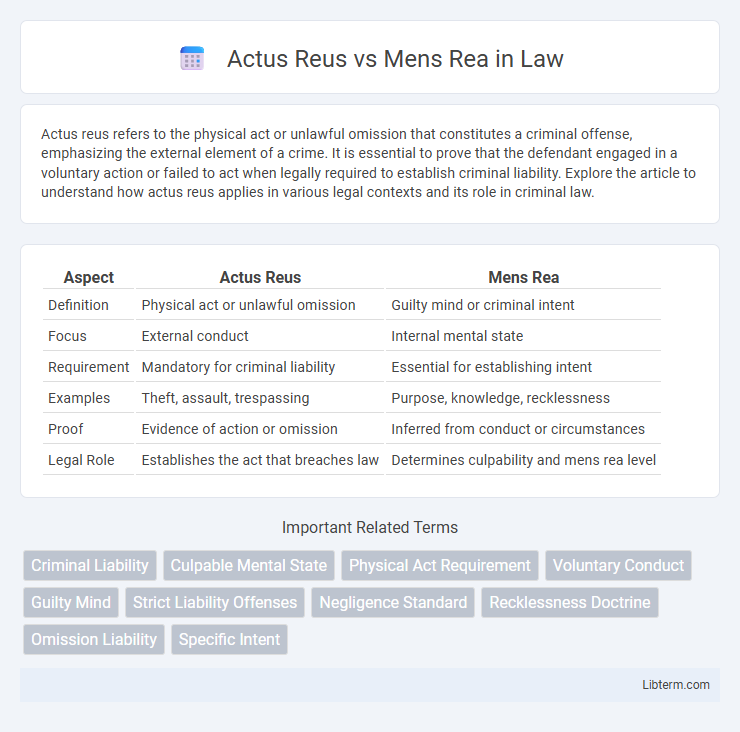Actus reus refers to the physical act or unlawful omission that constitutes a criminal offense, emphasizing the external element of a crime. It is essential to prove that the defendant engaged in a voluntary action or failed to act when legally required to establish criminal liability. Explore the article to understand how actus reus applies in various legal contexts and its role in criminal law.
Table of Comparison
| Aspect | Actus Reus | Mens Rea |
|---|---|---|
| Definition | Physical act or unlawful omission | Guilty mind or criminal intent |
| Focus | External conduct | Internal mental state |
| Requirement | Mandatory for criminal liability | Essential for establishing intent |
| Examples | Theft, assault, trespassing | Purpose, knowledge, recklessness |
| Proof | Evidence of action or omission | Inferred from conduct or circumstances |
| Legal Role | Establishes the act that breaches law | Determines culpability and mens rea level |
Understanding Actus Reus: The Physical Element
Actus Reus refers to the physical act or unlawful omission that constitutes a crime, serving as a fundamental component in establishing criminal liability. It involves voluntary conduct that results in a prohibited consequence, emphasizing the tangible aspect of criminal behavior. Understanding Actus Reus is essential for differentiating between mere thoughts and actionable criminal acts in legal proceedings.
Defining Mens Rea: The Mental State
Mens Rea, the mental state element of a crime, refers to the defendant's intent or knowledge of wrongdoing while committing the criminal act. It encompasses various levels of culpability, such as purpose, knowledge, recklessness, and negligence, each defining the defendant's state of mind. Establishing Mens Rea is essential for proving criminal liability, distinguishing accidental actions from deliberate or reckless behavior.
The Importance of Actus Reus in Criminal Law
Actus reus, the physical act or unlawful omission leading to a crime, is a fundamental component in establishing criminal liability, as it proves that the accused engaged in a prohibited behavior. Without actus reus, mens rea, or the mental intent, cannot result in conviction because the crime must involve a demonstrable action or conduct. This principle ensures that only those who physically commit or contribute to a criminal act can be held accountable under criminal law.
The Role of Mens Rea in Criminal Responsibility
Mens Rea, or the criminal intent, plays a pivotal role in establishing criminal responsibility by demonstrating the defendant's mental state at the time of the offense. Without proof of Mens Rea, even a clearly proven Actus Reus (criminal act) may not result in conviction, as many legal systems require both elements for culpability. The presence or absence of Mens Rea differentiates between intentional crimes, negligence, and strict liability offenses, profoundly affecting the severity of charges and sentencing.
Distinguishing Actus Reus from Mens Rea
Actus Reus refers to the physical act or unlawful omission that constitutes a criminal offense, while Mens Rea represents the mental state or intent behind the act. Distinguishing Actus Reus from Mens Rea is crucial in criminal law as it separates the objective conduct from subjective culpability, ensuring a defendant is only liable if both elements are established. Courts analyze the defendant's actions and intent independently to determine whether the crime's physical component and mental element coexist at the time of the offense.
Examples Illustrating Actus Reus and Mens Rea
Actus Reus refers to the physical act or unlawful omission that constitutes a crime, such as in cases where a person physically assaults another or unlawfully enters someone's property. Mens Rea involves the mental element, reflecting intent or knowledge of wrongdoing, seen in examples like planning a burglary or knowingly selling counterfeit goods. A classic illustration is in homicide cases: the actus reus is the act of killing, while mens rea involves the perpetrator's intention to cause death or serious harm.
How Actus Reus and Mens Rea Interact in Crime
The interaction between Actus Reus and Mens Rea is fundamental in criminal law, as Actus Reus represents the physical act of the crime while Mens Rea signifies the mental intent behind it. A crime is established only when a guilty act (Actus Reus) is combined with a guilty mind (Mens Rea), ensuring that liability is assigned to those who intentionally or knowingly engage in illegal conduct. Courts analyze both elements to determine criminal responsibility, emphasizing that an involuntary act or lack of intent generally negates criminal liability.
Strict Liability Offences: When Mens Rea is Not Required
Strict liability offences do not require proof of mens rea, meaning the defendant's intent or knowledge is irrelevant to establishing guilt. These offences focus solely on the actus reus, or the wrongful act, making liability automatic upon commission of the prohibited act. Common examples include regulatory violations such as traffic offences and public health breaches, where public safety takes precedence over individual culpability.
Legal Challenges in Proving Actus Reus and Mens Rea
Proving actus reus requires clear evidence of a voluntary physical act or omission directly causing harm, often complicated by ambiguous behaviors or involuntary actions. Establishing mens rea demands demonstrating the defendant's mental state or intent at the time of the offense, which is inherently subjective and relies heavily on circumstantial evidence or admissions. Courts frequently face legal challenges in correlating the timing of actus reus with the existence of mens rea to ensure both elements coincide for criminal liability.
Actus Reus vs Mens Rea: Implications for Justice and Fairness
Actus Reus, the physical act of committing a crime, and Mens Rea, the mental intent behind it, are fundamental to establishing criminal liability and ensuring justice. Accurate assessment of Actus Reus and Mens Rea helps prevent wrongful convictions by distinguishing between intentional crimes and accidental acts, promoting fairness in the legal process. Balancing these elements is crucial for courts to deliver verdicts that reflect both the defendant's actions and their state of mind, thereby upholding the integrity of the justice system.
Actus Reus Infographic

 libterm.com
libterm.com